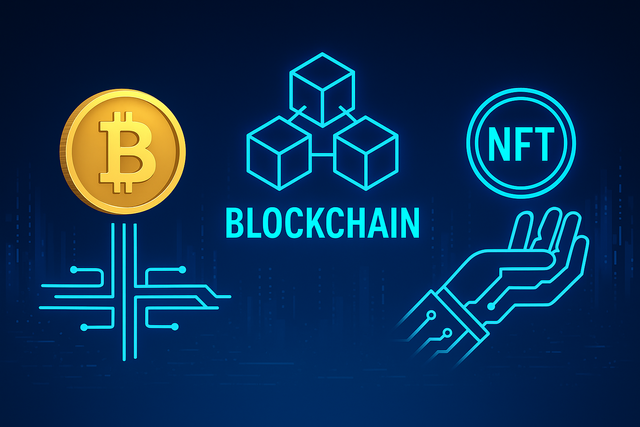The Decentralized Future: How Crypto, Blockchain, and NFTs Are Redefining Ownership and Freedom
Introduction
We are witnessing a silent revolution—one not led by governments or corporations, but by code, creativity, and communities. In the span of just over a decade, the emergence of blockchain technology and its offshoots—cryptocurrencies, decentralized finance (DeFi), and non-fungible tokens (NFTs)—has challenged traditional notions of value, trust, and ownership. This is not merely a financial shift; it is a philosophical and technological transformation that redefines how we interact with information, identity, and assets.
In this article, we will explore how the convergence of these innovations is reshaping the digital landscape, empowering individuals, and building a new framework for trust and autonomy.
- The Philosophy Behind Crypto: Code as Law
At the heart of cryptocurrency lies a radical idea: money should not be controlled by central authorities. Bitcoin, the first successful implementation of this idea, was born out of the 2008 financial crisis—a time when public trust in financial institutions collapsed. Satoshi Nakamoto's whitepaper introduced a decentralized peer-to-peer network that relied on cryptographic proof rather than trust in intermediaries.
Blockchain technology enables this by acting as a distributed ledger that is immutable, transparent, and verifiable by anyone. In essence, it replaces institutional trust with mathematical certainty. Code becomes law.
This philosophical underpinning has given rise to a broader movement toward decentralization, extending far beyond money into the realms of governance, media, and art.
- Decentralized Finance (DeFi): Reimagining Financial Systems
DeFi represents the practical application of blockchain philosophy to finance. Unlike traditional financial services, which are intermediated by banks and regulatory entities, DeFi operates via smart contracts—self-executing agreements coded on platforms like Ethereum.
Users can lend, borrow, trade, and earn interest on their assets without needing a centralized authority. This democratization of finance has opened access to millions of unbanked individuals and is eroding the monopoly of legacy financial systems.
However, with great innovation comes great risk. DeFi is still in its experimental phase, and issues such as smart contract vulnerabilities, rug pulls, and regulatory uncertainty remain significant challenges.
- NFTs: Beyond Art and into Identity
While NFTs first caught mainstream attention through digital art sales—like Beeple’s $69 million Christie’s auction—they represent much more than overpriced JPEGs.
NFTs are unique digital assets stored on a blockchain that prove ownership and provenance. This opens new dimensions of digital property rights:
Artists can sell their work without intermediaries.
Musicians can embed royalties directly into their NFTs.
Writers can tokenize chapters of their books.
Communities can issue NFTs as proof of membership.
Moreover, NFTs are gradually becoming digital identity tokens. Imagine a future where your diplomas, licenses, memberships, and even medical records are securely stored as NFTs in your digital wallet—verifiable by any institution in seconds.
- Web3: The Internet Owned by Users
Web3 is the term coined for the next evolution of the internet—one built on decentralized technologies. While Web1 was read-only and Web2 is read-and-write, Web3 is read-write-own.
In the Web3 ecosystem, users are no longer mere products for advertisers. Instead, they become stakeholders. Through tokens and DAOs (decentralized autonomous organizations), users can vote on governance issues, earn rewards for participation, and retain ownership over their data.
This paradigm shift has far-reaching implications:
Social media platforms without censorship or data harvesting.
Creator economies where fans directly support artists.
Open-source metaverses owned by their participants.
Web3 is not just a technological upgrade; it is a redefinition of digital sovereignty.
- The Role of AI in the Decentralized Ecosystem
Artificial Intelligence (AI) is also becoming increasingly integrated with blockchain. From decentralized AI marketplaces like SingularityNET to on-chain analytics for fraud detection, the synergy between AI and crypto enhances security, scalability, and functionality.
AI can help:
Automate smart contract auditing.
Predict DeFi market trends.
Personalize user experiences in metaverses.
Enable more intelligent DAOs.
When paired correctly, blockchain and AI form a powerful alliance that balances transparency with intelligent automation.
- Barriers to Mass Adoption
Despite its transformative potential, the crypto space faces numerous obstacles:
Regulatory ambiguity across jurisdictions
High entry barriers due to complex interfaces
Environmental concerns related to energy-intensive proof-of-work mechanisms (though mitigated by proof-of-stake)
Security risks such as hacks and scams
Education, UX improvements, and policy clarity are essential to bridging the gap between vision and mainstream adoption.
- A Call to Participation: Why This Matters Now
We are still early. Crypto and Web3 are in their formative years—akin to the internet in the 1990s. The decisions we make today will shape the digital architecture of tomorrow.
This revolution is not only for developers and investors. Writers, artists, educators, and everyday users all have a role to play. The blockchain is not merely a technology; it is a canvas for human creativity and a new contract for digital life.
Whether you’re minting your first NFT, joining a DAO, or just reading to understand more—your participation matters.
Conclusion: The New Renaissance
Crypto, blockchain, and NFTs are more than speculative assets—they are instruments of change. They offer us an opportunity to build a decentralized future based on transparency, fairness, and inclusivity.
As we stand on the cusp of this transformation, one truth becomes clear: the decentralized world doesn’t belong to a few — it belongs to all of us.
Welcome to the new renaissance.
🔗 Connect with me: https://linktr.ee/stefanodangello
